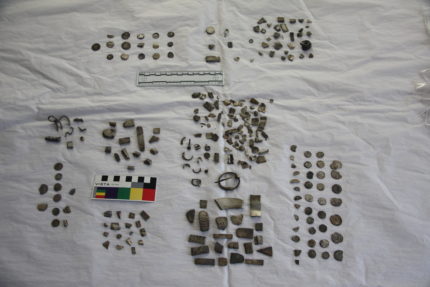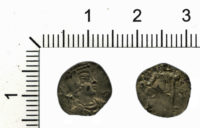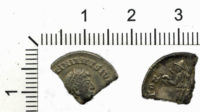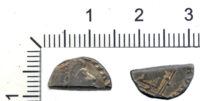 A hoard of Roman-era hacksilver — coins and other silver objects cut to pieces for use in trade — has been unearthed near Wem in Shropshire. It is the sixth hoard of Roman hacksilver ever found in Britain. The Wem Hoard was discovered by three metal detectorists at a rally last year. The first few coins were found on the surface. Then the metal detector alerted to something deeper under the ground and the finders began to dig. They came up with “handfuls of silver.”
A hoard of Roman-era hacksilver — coins and other silver objects cut to pieces for use in trade — has been unearthed near Wem in Shropshire. It is the sixth hoard of Roman hacksilver ever found in Britain. The Wem Hoard was discovered by three metal detectorists at a rally last year. The first few coins were found on the surface. Then the metal detector alerted to something deeper under the ground and the finders began to dig. They came up with “handfuls of silver.”
 The discovery was reported to the local finds liaison officer of the Portable Antiquities Scheme. A follow-up excavation last week unearthed additional silver pieces. Peter Reavill, finds liaison officer for Shropshire and Herefordshire, testified at this week’s treasure inquest that all the objects were part of the same hoard.
The discovery was reported to the local finds liaison officer of the Portable Antiquities Scheme. A follow-up excavation last week unearthed additional silver pieces. Peter Reavill, finds liaison officer for Shropshire and Herefordshire, testified at this week’s treasure inquest that all the objects were part of the same hoard.
“That hoard is the largest hacksilver Roman hoard we have from the West Midlands. It contains both hacked-up vessels and brooches and buckles, but it also includes a number of Roman coins from the very end of the Roman Empire.
“Analysis which has been done at the British Museum suggests that it goes in the ground in the fifth century – 460 to 500AD.
“We know at that time that the monetary system in Britain has completely collapsed and we are based on a sort of bullion – the weight of the silver in the coins and the objects.
“That’s been hacked up and put into very small pieces so that it can be paid out to people like mercenaries to protect you, but also to traders.
Not surprisingly, the coins are in terrible condition. Most of them are so thoroughly clipped, worn and cut that it’s not possible to determine which type they are, never mind which mint issued them. Of the ones that can be  identified, about half of them date to the reign of co-rulers Arcadius and Honorius (395-402 A.D.). Pieces of silver vessels, plates and buckles were also found in the hoard, as was an intact silver brooch which may have been used to pin together a cloth or bag that held the goods before it rotted away.
identified, about half of them date to the reign of co-rulers Arcadius and Honorius (395-402 A.D.). Pieces of silver vessels, plates and buckles were also found in the hoard, as was an intact silver brooch which may have been used to pin together a cloth or bag that held the goods before it rotted away.
All but one of the coins, 66 of the 67 found, are siliquae, small, thin silver coins produced starting in the 4th century. They were flimsy and cranked out quickly in large numbers, making them prone to cracking and striking  errors. They were also easy to clip because of how thin they were. Clipping — trimming the silver off the edges leaving only the imperial portrait on the obverse largely intact — was a common practice in late Roman Britain although siliquae from elsewhere in the empire are rarely clipped. They were clipped face-up to preserve the portrait while the borders, mintmarks, inscriptions and reverse designs were damaged or destroyed. Historians believe clipped siliquae were the first hard currency used by Saxons.
errors. They were also easy to clip because of how thin they were. Clipping — trimming the silver off the edges leaving only the imperial portrait on the obverse largely intact — was a common practice in late Roman Britain although siliquae from elsewhere in the empire are rarely clipped. They were clipped face-up to preserve the portrait while the borders, mintmarks, inscriptions and reverse designs were damaged or destroyed. Historians believe clipped siliquae were the first hard currency used by Saxons.
The one coin that is not a siliqua is a denarius from the 1st century A.D. It is heavily worn but unclipped, so it appears to have been pressed into action as bullion after 400 years or so in circulation. It’s extremely rare to find a single denarius in a hoard of siliquae. There is only one other marginally comparable example (the Patching Hoard) but it had a more varied composition overall.
 The Wem Hoard siliquae are so end-stage clipped that even the imperial portraits are encroached upon, and the ones that were clipped were just cut up into halves and quarters. The coins illustrate the trend at that time and place for increasingly small pieces of hacksilver functioning as currency. Wem is far enough inland that it probably hadn’t seen new imports of coinage for years before Roman occupation ceased. By the time this hoard was buried, the area had almost entirely transitioned to a bullion economy.
The Wem Hoard siliquae are so end-stage clipped that even the imperial portraits are encroached upon, and the ones that were clipped were just cut up into halves and quarters. The coins illustrate the trend at that time and place for increasingly small pieces of hacksilver functioning as currency. Wem is far enough inland that it probably hadn’t seen new imports of coinage for years before Roman occupation ceased. By the time this hoard was buried, the area had almost entirely transitioned to a bullion economy.
Hooray Vista!
A fantastic find, but mere trinkets and junk left over from other times.
But the gold/silver ratio was not 90 then either…probably closer to 15.
This is how back then the ‘Quarter-Siliquae‘ were invented.
Likewise, the need for small change was met by cutting full pennies into halves or quarters. But on those, the cross made the cutting much easier.
:hattip:
——–
Find four quarter-pennies,
pick them up, and all the day
you’ll have good luck.